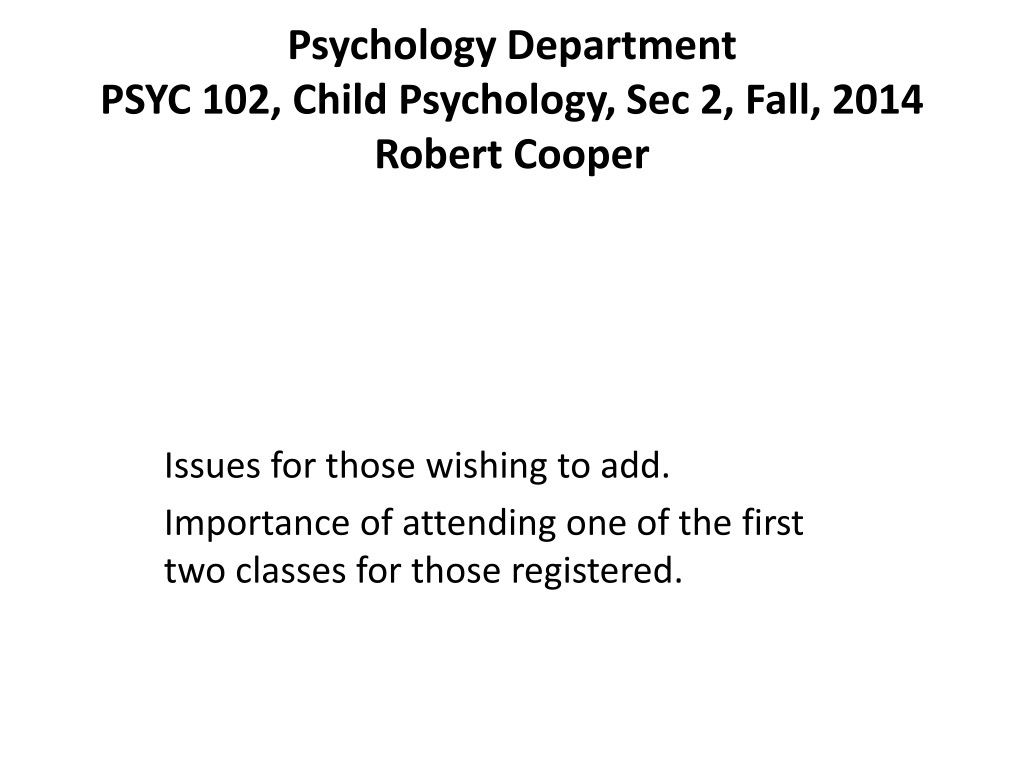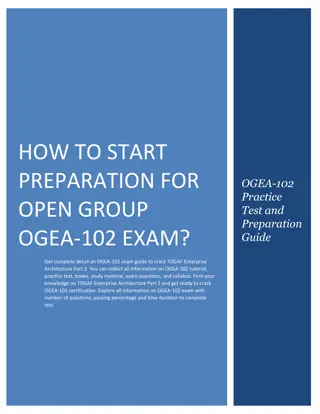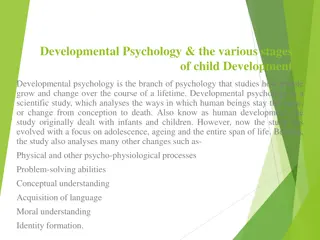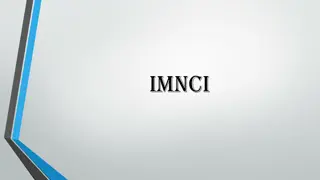PSYC 102: Child Psychology Course Overview
This course provides an in-depth exploration of psychological development in children from conception to adolescence. Students will examine normative and individual aspects of development, theories of cognitive, social, and emotional growth, and the various factors influencing child development. Course materials, faculty contact information, and learning objectives are outlined for students' reference.
Download Presentation

Please find below an Image/Link to download the presentation.
The content on the website is provided AS IS for your information and personal use only. It may not be sold, licensed, or shared on other websites without obtaining consent from the author.If you encounter any issues during the download, it is possible that the publisher has removed the file from their server.
You are allowed to download the files provided on this website for personal or commercial use, subject to the condition that they are used lawfully. All files are the property of their respective owners.
The content on the website is provided AS IS for your information and personal use only. It may not be sold, licensed, or shared on other websites without obtaining consent from the author.
E N D
Presentation Transcript
Psychology Department PSYC 102, Child Psychology, Sec 2, Fall, 2014 Robert Cooper Issues for those wishing to add. Importance of attending one of the first two classes for those registered.
Outline for each Lecture 10 PM the day before a lecture the outline will be available on my web site: www.sjsu.edu/people/robert.cooper Psyc 102.02, Lecture Outline, August 22, 2014 Introduction to course (readings, assignments, tests, grading scheme, etc.) Intro to Professor Focus on characteristics that are relevant to Developmental Psychology (e.g., SES, family structure, ethnicity, etc.) Conception of human development and the nature/nurture issue Preformationism, Empiricism, Predeterminism, etc. In-class writing assignment: self-concept at 2 years, 5 years, 10 years, 15 years Developmental Psychology as a Science
Faculty Web Page and MYSJSU Messaging Course materials such as syllabus, handouts, notes, assignment instructions, etc. can be found on my faculty web page at http://www.sjsu.edu/people/robert.cooper. You are responsible for regularly checking with the messaging system through MySJSU to learn any updates.
Course Description SJSU Course Catalog Description: Psychological development of children from conception to adolescence, including perceptual, cognitive, personality and social development. Outside activities may be required. Prerequisite: PSYC 001 (General Psychology).
Course Goals and Learning Objectives Upon successful completion of this course, students will be able to: CLO1: Recognize normative (i.e., average or typical ) and individual aspects of development CLO2: Identify and describe psychological theories and concepts of cognitive, social, and emotional development CLO3: Have an appreciation of the variety of factors that may influence the process of development, including the potential impact of such factors as genetics, ethnicity, culture, gender, and socioeconomic status
Textbook DeHart, G. B., Sroufe, L. A., & Cooper, R. G. (2004). Child development: Its nature and course (5thEd,). McGraw Hill. ISBN: 0-07- 249141-8. Donate proceeds from books bought for this class to ALS Association Ice bucket challenge after class on Thursday
The course requirements and their weighting in the grading system are as follows: Two mid-term tests (20% of the grade each) 40% 10% 20% In-class writing Paper Analysis of popular article (5%) Evaluation of popular article with at least two research studies (15%) Final 30%
Course Schedule Week Date Topics, Readings, Assignments, Deadlines 1 8/22 Introduction to course, Introduction to Developmental Psychology 2 8/27 8/29 9/3 Chapter 1, The Nature of Development, Major theories Major issues in Developmental Psyc., Developmental Methods Chapter 2: Contexts of Development, Bronfenbrenner s Model ***Last day to drop a class** Family, SES, Culture 3 9/5
Conception of Human Development Preformationism: dark ages, roots of nativism Empiricism: John Locke (1632-1704), roots of learning approaches Preformationism: Jean-Jacque Reusseau (1712- 1778), roots of interactionist approaches Evolution: Charles Darwin(1809 1882) Behaviorism: John Watson (1878 1958) Constructivism: Jean Piaget (1896 1980)
Intro to Robert Cooper Ethnic background includes Scottish, English Moroccan Jewish, and Native American. Parents were school teachers and I am the second of five children. Began college as a physics major, but changed to psychology in my junior year. Areas of specialization in cognitive/developmental psychology: development of math and science concepts, ethnicity and SES effects on school success.
Computers & Power Points Computers in class Effects of taking notes on computers Effects of multitasking Power Points Controversy about providing slides I will post them after the lecture
Self ConceptIn-class writing Retrospective report: Describe your concept of yourself at different points in your life. 1. At age 2 2. At age 5 3. At age 10 4. At age 15 One or two sentences for each age. Put your name and date at the top of the page.
Developmental Psychology as a Science Diary Studies Normative/descriptive studies Correlational studies Experimental Studies
























